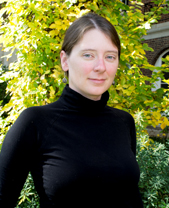Our last morning in Delhi was free, and I took the opportunity to visit some of the older sites in the city. Beginning at the Claridges Hotel, I walked to Safdar Jung’s Tomb, the resting place of a Lucknow nawab who moved to Delhi in his later years. The model of Humayun’s Tomb was certainly evident in the complex, but the more interesting factors were definitely the Lucknow ornamental touches. The site, not attracting the numbers of people that many of the Mughal sites attract, was a nice reprieve from masses of people we had seen at Qutb Minar or even Humayun’s Tomb in the late evening.

Safdar Jung's Tomb
I next walked just down the road to the Lodhi Gardens, a complex of tombs, mosques, and gardens that proved to be more popular with early morning walkers. I wandered through much of complex, seeing the major monuments and noticing what Anubha had described to us the day before. The British colonials had cleared all of the fabric around the monuments so that they sat in these gardens, something like follies in an English garden.

Lodhi Gardens

From here, what I thought would be a short walk to Purana Qila turned out to be quite a long distance. Nevertheless, I made it to the site and found it and the adjacent zoo packed with people.

Purana Qila

Sher Mandal, Purana Qila
In the afternoon, our group rejoined to go to the Delhi Haat, a designed bazaar that provides a wonderful venue for various craftsmen and craftswomen to sell their products. The variety and quality of crafts was amazing, and I noticed that people had traveled from quite a distance (even Tamil Nadu in the south of India) to sell items here.

Delhi Haat
We returned to the hotel for a farewell dinner. The conversations and speeches were full of reminiscences of the past two weeks: we had shared in such incredible adventures, had survived a mini-”plague,” had endured hours on various transportation vehicles, had seen and been inside buildings many of us never thought we would see. And through it all, as Adnan pointed out in his toast, the group remained cheerful and easy-going. It was an experience that I wouldn’t dare condense in just a few short adjectives. I met some of the most incredible people on this trip who shared their thoughts and observations of the things we saw and were graciously interested in mine, too. I felt extraordinarily fortunate every minute of the trip to be with so many thoughtful intellectuals and to share in the experiences and sights. Many toasts were made this evening, all deserving. Two, in particular, deserve to be repeated here. Cheers and many, many thanks to Adnan and Anubha for organizing the trip, for spending such generous amounts of their time, expertise, and efforts in planning, and for their patience and enthusiasm in guiding us through the tight streets and expansive complexes. And, an incomparable thank you to SAH and those who have contributed to the Scott Opler Foundation for making this tour possible for a graduate student and providing an opportunity that I wouldn’t have had for many more years if ever, I am sure.

 Gretta Tritch Roman, Ph.D. Candidate, Penn State University
Gretta Tritch Roman, Ph.D. Candidate, Penn State University
Gretta Tritch Roman is a Ph.D. candidate in art and architectural history at the Pennsylvania State University. She earned a Bachelor of Architecture at the University of Arkansas and her Master’s degree in art and architectural history at the Pennsylvania State University where she completed a thesis titled, “
La mise en scène icarienne: The Construal of Utopian Space in Nauvoo, Illinois, 1849-58.” Recently her research has focused on strategies of eclectic designs and the ways in which varying audiences respond to such buildings, opening discussions that have ranged from Lucknow, India, to Chicago, Illinois. Currently she is working on her dissertation under the working title, “Rivalry, Revivalism, and Ritual: Building the Grain Exchanges of the American Midwest, 1875-1930.”